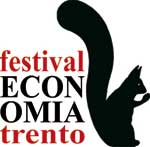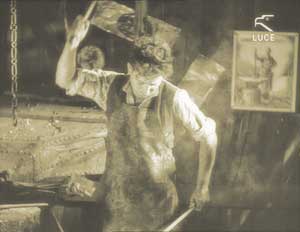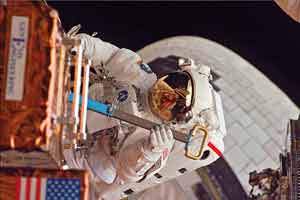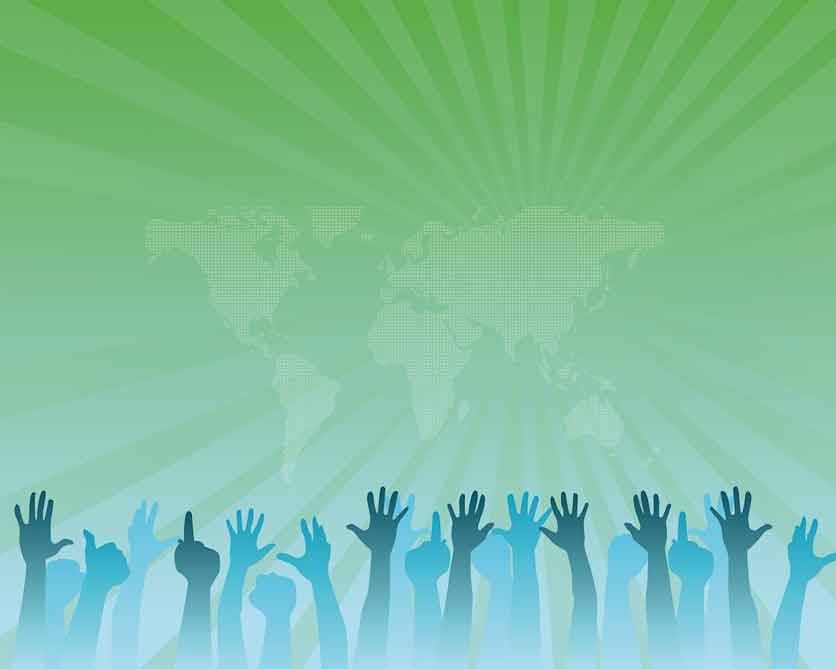| |
 THE MARKET ECONOMY AND DEMOCRACY THE MARKET ECONOMY AND DEMOCRACY
Caterina Dominici
The 20th Century was dominated by the epic clash between the Socialist and Capitalist models. After the tragic World War unleashed by Nazi fascism, this clash later took the form of the Cold War, played out in the shadow of the self-destructive catastrophe of nuclear war.
It was a clash which was both political and economic in nature; a clash between the countries in which Real Socialism was practised and those of the West. A contest between the Marxist economy in which means of production are collectively owned and planned by the State and the laissez-faire model founded on private property and freedom of the market.
Both were coming to terms with the problem of democracy.
It is no longer up for debate that the fundamentals of freedom and democracy (which are two sides of the same coin) were in practice denied by Real Socialism. 
Winner of the Nobel Economics Prize, Friedrich von Hayek, had certainly been correct to assert: What good is it to write on a piece of paper that there is freedom of the press, when all the paper mills and all the printing facilities belong to the State, in other words those who are in power? A State in which private property does not exist is a State in which all fundamental freedoms are automatically cancelled.
The engine that motivates the market economy is profit maximisation, which stimulates creativity and business risk.
It is a dramatic contest in which the strongest eats the weakest. This applies as much to the individual company as it does to the country's entire system of enterprise. Competition has brought with it extremely rapid evolution of scientific and technological progress as well as the consumer society.
It is equally true that capitalist development has been and may still today be the source of profound inequality and social injustice for the weaker countries of the Third and Fourth World. These are also in evidence amongst social classes within those same very rich countries in which the new poverty is a highly topical issue.
The wars set off after September the 11th are deeply rooted in economic issues and the vital interests of oil resources rather than in problems of freedom and democracy.
And yet the Constitutions which underpin the States with market economies, like those of the United States of America and the countries of Europe, are amongst the most enlightened in the history of humanity in their respect towards the individual, freedom and democracy.
Although democratic systems in market economies are full of weaknesses, they do today represent the best expression of social harmony.
 In the clash between Real Socialism and Capitalist Society, the latter's victory has been total, whether from the perspective of economic and social progress or in terms of the scope available for democracy and real freedom. In the clash between Real Socialism and Capitalist Society, the latter's victory has been total, whether from the perspective of economic and social progress or in terms of the scope available for democracy and real freedom.
Even the last great Communist empire of China has transformed its own economy on the basis of the profit model. It has become an ultra laissez-faire market, lacking in goals of social protection and respect for the environment.
It is highly probable that the profit and freedom of private enterprise in the market economy are destined to cause the contradiction within the Communist Party's dictatorial power to burst: a contradiction reinforced by the latter's totalitarian character which denies its citizens the ability to fully exercise their freedom and fundamental democratic rights.
Similarly, the final Communist bastion of Cuba also seems to be opening itself to the market economy.
The debate on the relationship between the market economy and democracy nowadays sets itself completely within the context of a society which is part of the global market economy.
There are two main schematic theories to be compared in such a framework:
The theory of an ultra laissez-faire economy with no rules except for profit maximisation and free competition to regulate everything. This is a theory which denies or tends to marginalise the regulatory role of the State.
The opposite theory is one which does not deny profit and the free market. However, it retains the general interest as a priority, which has been known since the first ancient Greek democracy as the Common Good. This theory demands a strong role for the State because the power to dictate the rules which guarantee the Common Good is vested in the State.
Therefore more State and not less State is necessary.
The major contradiction is that while the free market economy has been completely globalised, there has in parallel been a lack of direction from the Global State. A Global State with the power to dictate new rules for the organisation of economic justice, social protection, respect of human rights, liberty and democracy and inclusive of all populations and peoples of the planet.
States are divided by their national interests which are often in conflict. The same Europe which can boast of the most advanced model of social welfare is still far from being capable of managing supranational political powers, while the UN is an ageing instrument lacking real powers.
At the same time, the relationship between market economy, democracy and freedom is not at all foreseeable for every situation.
A democratic State cannot disregard the freedom of the market economy governed by the restraint of rules. But the market economy can certainly develop in its worst form in States without democratic rules.
The market economy responds to the law of profit and free competition and not to ethics. And it is the State's responsibility to establish the rules of the game in respect of democracy and the ethical codes of justice and equality of societies across the planet.
An unavoidable question needs to be asked: is it the economy which shapes politics or vice versa, is it politics which shape the economy?
The answer is not unambiguous. The response can be understood as a permanent dialogue between the interests expressed by freedom of enterprise (i.e. the market economy) and those very regulators of the democratic State who answer to the objective of the Common Good.
Today the market economy dominates all over the world.
Information moves in real time across the whole planet and with a simple click, financial capital can be moved from one end of the world to another. This assigns different types of State economies (not only just the weakest ones) as good and bad without any democratic control.
The great multinationals once blazed a trail for the internationalisation of companies. Today an enterprise which wants to resist global competition must in its own turn be internationalised.
The phenomenon of business outsourcing is felt in Trentino just as it is in all parts of the world. It is now universally apparent that business migrates towards markets which have a lower cost of labour, lower taxes and no red tape of the type which creates environmental or union safeguards.
The clear contradiction is that a financial or entrepreneurial company inserted within a democratic State is compelled to act according to democratic rules which have been established by political power. Meanwhile, when that same financial or business enterprise acts outside the democratic State and is established in weak and/or undemocratic States, it acts in the worst way possible through extensive exploitation of local resources and labour.
Everyone is aware of the scandals of child labour exploitation, of inhumane working conditions, of the rampant spread of corruption at all levels, of unchecked freedom, of the movement of the most dangerous, hazardous and polluting work into the poorest countries…
The start of the third millennium has been distinguished by unforeseen problems which are global in nature.
For the first time in the history of mankind, we are on the brink of planetary ecological catastrophe. This has been caused by exponential demographic growth (of the type seen in the poorest countries) and by economic and consumer development which was once thought of as unlimited. Vital resources like drinking water become ever more precious and food prices rise higher and higher.
Even the USA now recognises the existence of the greenhouse effect which pollutes the air we breathe, the melting of polar ice caps, the shrinkage of tropical rainforests, the advance of desertification, the disappearance of numerous animal and plant species, the pollution of ever vaster parts of the ocean…
To accommodate the development of consumption claimed by the new emerging economies such as those of China and India, there would need to be another planet in reserve.
But there is only one World and only the last drops of oil remain.
The global market economy given free rein marches to its own destruction. 
To avoid such a fearsome prospect it is necessary to find a level of political consensus and decision-making which can operate on a planetary level. There is therefore a need for strong policy from International Organisations to order an end to such excessive development of the economy and the market. This must be done in the name of democracy or the people's government, in this case represented by the whole of humanity. It is urgent and necessary to dictate new rules for the market economy for the sake of the Common Good, which identifies itself with safeguarding the life of the Planet. This will begin to eliminate the waste and turn us towards development compatible with the actual resources that the world and humanity can afford.
The current laissez-faire market economy is thus on a collision course with the need for a market economy to operate only within the limits of available resources which are finite and not infinite.
Just like science, the market economy is also a measure of progress according to the way in which it is used.
Democracy needs political power (led from the worldwide "polis") which urgently dictates the new rules of compatible development oriented to the restructuring of economic, financial and technological resources: starting from energy resources and moving towards a process of equality and social justice for all.
It would be sufficient to redirect the expenses of wars and the chase for arms, in order to build up the resources for this exceptional global economic restructuring effort. A restructuring which runs hand in hand with the need for a planet-wide culture of humanity. The awareness that the planet is getting smaller and that people must behave as if they belong to a single human family in a real spirit of fraternal solidarity.
Is this a utopia? Perhaps. But without this utopia there is no future.
|
|